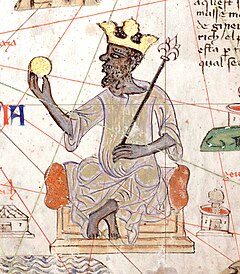
Mansa (N'Ko: ߡߊ߲߬ߛߊ;[1] pl. marnsa) is a Maninka[2] and Mandinka[3] word for a hereditary[1][4] ruler, commonly translated as "king".[5][6][7] It is particularly known as the title of the rulers of the Mali Empire, such as Mansa Musa, and in this context is sometimes translated as "emperor".[8] It is also a title held by traditional village rulers, and in this context is translated as "chief".[1]
Mansa contrasts with another Manding word for ruler, faama. Faama emphasizes the military, coercive authority of a ruler,[9] and can be translated as "tyrant",[10] whereas mansa refers to a hereditary ruler whose authority is derived from tradition[1] and mystical power.[9] A ruler can be both a faama and a mansa, but a mansa was not necessarily a faama.[9]
The word mansa (Arabic: منسا, romanized: mansā) was recorded in Arabic during the 14th century by North African writers such as Ibn Battuta and Ibn Khaldun, who explained it as meaning "sultan".[11] Cognates of mansa exist in other Mandé languages, such as Soninke manga, Susu menge, and Bambara masa.[2] Vydrin also compared it to mensey, the Guanche word for their rulers.[1] According to Misiugin and Vydrin, the original meaning of the root word was probably "chief of hunters" or "chief of warriors".[2]
An alternate translation of mansa, which Jansen attributes to the followers of Marcel Griaule, is that mansa means "god", "the divine principle", or "priest-king". Jansen notes that they have not provided their reasoning for choosing this translation.[6]
- ^ a b c d e Vydrin 2015, p. 260.
- ^ a b c Misiugin & Vydrin 1993, p. 105.
- ^ Schaffer 2005, p. 333.
- ^ Jansen 1996, p. 99.
- ^ Macbrair 1839, p. 40.
- ^ a b Jansen 1998, p. 256.
- ^ Conrad & Condé 2004, pp. xv, 198–199.
- ^ Sutton 1997, p. 221.
- ^ a b c Chappatte 2022, p. 22.
- ^ Vydrin 2015, p. 218.
- ^ Levtzion & Hopkins 2000, pp. 289, 333.